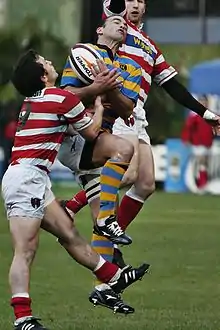Rugby shirt
A rugby shirt, also known as a rugby jersey, is worn by players of rugby union or rugby league. It usually has short sleeves, though long sleeves are common as well.

Rugby shirts have a buttoned opening at the top, in a similar style to polo shirts but with a stiffer collar. Modern rugby shirts often have a very small collar so as to provide less material for a potential tackler to latch onto (even though such an action is illegal in a game). Due to the nature of the game, the fabric is generally strong, and traditionally rugby shirts have rubber buttons so that they would, if pulled on in a game, come undone rather than pop off.
A traditional design of rugby shirt consists of five or six horizontal stripes or "hoops" in alternating colours. Rugby league shirts often have a large 'V' around the neck as part of their design. Football shirts, by contrast, traditionally generally have vertical stripes. Rugby shirts, like most sport shirts, will usually have a number on the back, though shirts not meant for competitive play will usually forgo this. Logos and labels of sponsorship are now common, and generally appear on the abdominal area of the shirt.
Materials
Rugby shirts were traditionally made out of cotton, but as synthetic fabrics became cheaper they have become incorporated into rugby shirts.[1] The two most common materials are a mix between cotton and polyester (many of these shirts are meant for supporter use, though they can be used in a rugby game), and pure polyester (these shirts are generally designed for game use).
The reason for the preference of polyester in a game situation is twofold: firstly, polyester is harder to get hold of in a tackle situation, as it is inherently more 'slippery' than cotton or a cotton-blend. In addition, the increasing use of skin tight shirts further enhances this effect, as there is no loose material for a tackler to get a grip of. The other benefit of man-made fibre over cotton is that it absorbs less water and mud. As rugby is a sport played mainly in winter and/or bad weather, a cotton rugby kit can weigh around 6 to 8 lb (2.7 to 3.6 kg) when wet. This extra weight has to be carried by the player, in addition to running in wet, heavy ground.
The gaining popularity of rugby sevens has made more of a demand for lighter, more breathable jerseys as well. Rugby sevens is a faster, more wide open game in which players compete 7 versus 7 as opposed to 15 versus 15.
The rugby shirt has, in numerous cultures, become a popular fashion item, with many clothing manufacturers producing rugby styled shirts, with the distinctive collar and hooped or squared design, which do not represent an actual club.
See also
References
- "History of rugby shirts". Rugby15. 2007-02-28. Archived from the original on 2007-09-28.